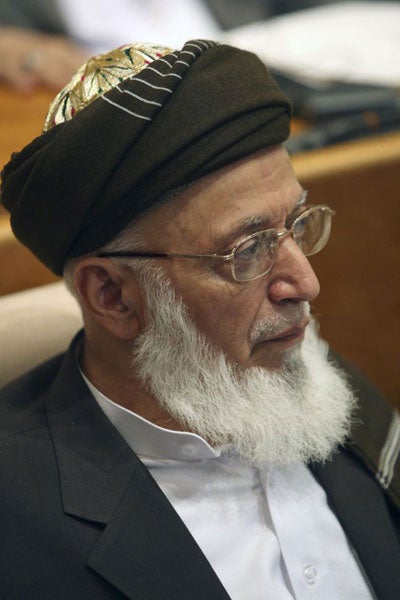Ex-Afghanistan president killed

A suicide bomber hiding explosives in his turban assassinated former Afghan President Burhanuddin Rabbani, who headed a government peace council trying to cultivate contacts with Taliban insurgents. Four of Rabbani's bodyguards also died and a key presidential adviser was wounded in the attack at Rabbani's Kabul home today.
President Hamid Karzai cut short a visit to the US over the killings, which dealt a harsh blow to peace efforts after a decade of war.
The turban bomber entered Rabbani's house in the evening and blew himself up inside, said Mohammad Zahir, the chief of criminal investigation for the Kabul police. Fazel Karim Aimaq, a former politician from Kunduz province and a friend of Rabbani's, told reporters outside the former president's home that a man who arrived to meet Rabbani was not properly searched. The visitor shook Rabbani's hand and bowed as a sign of respect, Aimaq said.
"Then his turban exploded," he said.
Rabbani's death will also dent efforts to keep the regional and ethnic rivalries that partly feed the insurgency in check. As one of the wise old man of Afghan politics and the leader of the anti-Taliban Northern Alliance, Rabanni's role in the attempts to reach out to the Taliban and seeking a political deal with them — with the US blessing — will be hard to replicate in the near future. His death could unleash a well of resentment building up among some senior Northern Alliance members, who accuse Karzai of colluding with the Taliban.
President Barack Obama said the killing will not deter the US and Afghanistan from helping that country's people live freely. He said the former president's death is tragic because he was a man who cared deeply about Afghanistan. Obama commented at the top of a meeting in New York with Karzai.
Shukria Barakzai, a lawmaker from Kabul, was visibly shaken as she stood outside Rabbani's house in the Wazir Akbar Khan area of the city, near the US Embassy and Nato headquarters.
"We don't want the whole peace process to get stuck," she said. "We have to continue, we have to."
Rabbani, who was about 70 years old, headed the country's High Peace Council, which was set up by the Afghan government to work toward a political solution to the decade-long war. However, it had made little headway since it was formed a year ago.
Just last week, Rabbani led a conference of provincial governors and officials who met in the southern city of Kandahar to develop policies for reintegrating insurgents who want to give up the fight.
The reintegration of lower-level militants has started alongside the push for higher-level peace talks as a way to whittle away at the insurgency on both ends. At the conference, he urged those in the provinces to work to counter insurgent propaganda claiming that international forces were invaders in Afghanistan.
Rabbani was president from 1992-1996, heading the Afghan government that preceded the Taliban rule. After he was driven from Kabul in 1996, he became the nominal head of the Northern Alliance, mostly minority Tajiks and Uzbeks, who swept to power in Kabul after the Taliban's fall. Rabbani, an ethnic Tajik, headed the Jamiat-e-Islami political party.
"We lost our leader. We lost our leader," Habibullah, a close friend of Rabbani's, said as he stood crying outside a hospital.
Already Afghanistan's ethnic minorities have begun to re-arm in the face of negotiations with the Taliban. Rabbani's death is likely to accelerate the re-arming and lay the foundation for a bitter civil war once US combat troops leave the country or take on support roles by the end of 2014.
Karzai's adviser Mohammad Masoom Stanekzai was wounded in the attack. A relative who answered Stanekzai's phone said that the wounds did not appear to be life-threatening, but Stanekzai was in the hospital.
Stanekzai is chief executive of the Afghanistan Peace and Reintegration Programme, a highly touted programme funded by the US and its coalition allies to bring mid- and lower-level Taliban back into Afghan society. The programme has so far only managed to reintegrated about 2,000 of the estimated 25,000-40,000 insurgents in Afghanistan.
Reintegration was the other half of reconciliation, which is aims to try and broker a peace deal with the senior Taliban leadership.
Hamed Elmi, deputy spokesman for Karzai, said the president was shocked when he heard the news while in New York for a meeting at the United Nations and planned to return to Kabul immediately.
Join our commenting forum
Join thought-provoking conversations, follow other Independent readers and see their replies
Comments
Bookmark popover
Removed from bookmarks